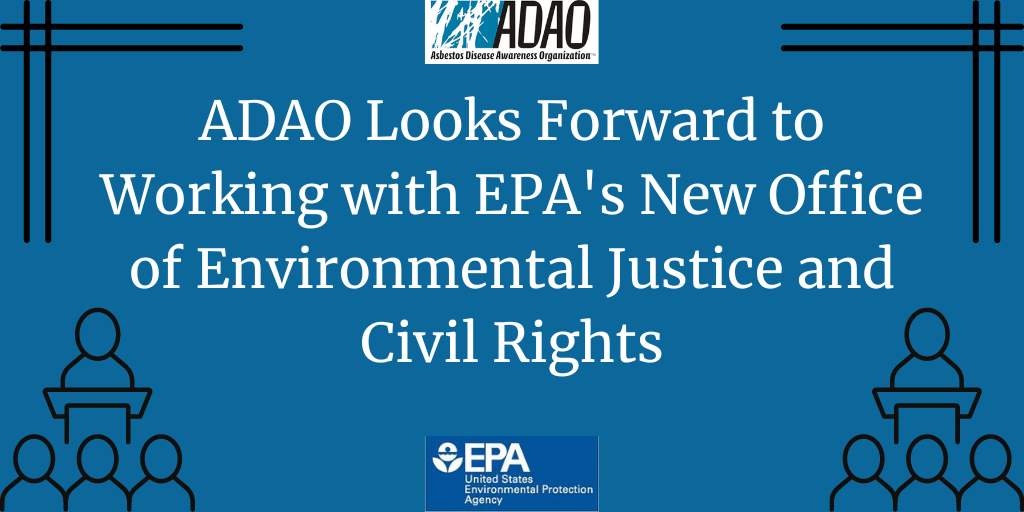Posted on October 11, 2022
The Asbestos Disease Awareness Organization (ADAO) is encouraged to learn that the U.S. Environmental Protection Agency (EPA) has established an office dedicated to protecting and advancing environmental justice and civil rights. We look forward to discussing the health impact of asbestos and prevention efforts to mitigate exposure. For too long the most vulnerable communities in the United States have disproportionately suffered from environmental injustices as air, water, and soil of their communities have been polluted and poisoned. We know asbestos deaths are higher in low income and communities of color, and like other forms of environmental injustice, it is unacceptable. We hope to work closely with this new office of EPA to make clear the cost of asbestos imports and use on these communities and the importance of policies that save lives and keep communities safe and thriving. 
The Office of Environmental Justice and External Civil Rights, led by Marianne Engelman-Lado, Acting Principal Deputy Assistant Administrator, will have 200 people working agency-wide to tackle the most pressing issues. This is a wonderful step toward ensuring the protection of public health in our country. It’s also a great opportunity to increase asbestos education and prevention efforts. Environmental justice issues and crimes impact Americans in a myriad of ways, including through exposure to toxic chemicals, causing diseases, suffering, and death.
Asbestos, a known carcinogen that kills over 40,000 Americans each year, contributes to environmental racism due to the disproportionate impact of environmental hazards on communities or color, including pollution, carcinogens, and unclean water. Asbestos has a deadlier impact on communities of color through legacy asbestos — living in older houses that contain asbestos, attending schools and workplaces that were built using asbestos — and direct exposure through chemical companies and industries with high cancer risks.
The science is abundantly clear — there is no safe level of exposure to asbestos. Black, brown, indigenous, and lower-wealth communities have disproportionately been the dumping grounds for our country’s deadliest toxic chemicals and pollutants, such as asbestos. People in these communities are also more likely to live in older houses that contain asbestos, attend deteriorating schools that were built using asbestos (and have yet to be properly renovated), and work in industries with high asbestos exposure and cancer risks. The people in these communities often do not have the time or resources to fight against these injustices or hire lawyers to bring their case to court, which companies know and take advantage of.
Davidson, North Carolina, is a tragic example of environmental injustice where there are more than 2,000 tons of asbestos-contaminated soil on the 130-year-old Linden Mill. When the mill was first turned into an asbestos manufacturer, it was a boon for Black workers, who had not previously been allowed to work at the cotton mill, but were employed at the factory. According to recent reporting by WFAE, many workers developed deadly asbestos-caused diseases and ultimately lost their lives, leading to a deep sense of distrust among longtime residents.
Although there are only three companies who import and use chrysotile asbestos in eight or less chlor-alkali plants. Without an asbestos ban, asbestos remains legal and lethal in the US. We need to pass the Alan Reinstein Ban Asbestos Now Act (ARBAN) of 2022, introduced by Senator Jeff Merkley and Representative Suzanne Bonamici. It would start saving lives and addressing environmental racial inequalities. During the past century, the U.S. imported over 31 million metric tons of asbestos.
We applaud EPA’s great step forward in protecting disenfranchised people and communities across the country and look forward to working with EPA as they advance their mission to give all community access to toxic-free air, water, and soil.
In Unity,
Linda Reinstein
